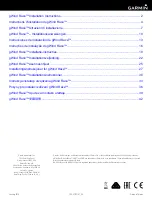
NX-210(G)
34
TROUBLE SHOOTING
l Checking the output signal
from the ASIC
Points to be checked
Normal voltage
SBC R218
3.3V
When an abnormal
value is confirmed.
When a normal
value is confirmed.
When a normal
value is confirmed.
l The LCD displays control
It is unlikely that the BGA parts are broken.
Points to be checked
Normal voltage
/CS4 IC302 (7 pin)
3.3V 0V 3.3V
Points to be checked
Normal voltage
/DRST C343
3.3V
Points to be checked
Normal voltage
5A IC205 (5 pin)
5.0V
If 5A is 0V, parts other than the BGA are broken.
If the /CS4 is 0V or 3.3V, the ASIC/FLASH/SRAM
may be broken.
If the /DRST is 0V, the ASIC/FLASH/SRAM are broken.
Remove R218. If the ASIC side is 0V,
the ASIC/FLASH/SRAM may be broken.
Points to be checked
Normal voltage
/LCDRST R25
3.3V
Remove R25. If the ASIC side is 0V,
the ASIC/FLASH/SRAM may be broken.
When a normal
value is confirmed.
When a normal
value is confirmed.
When a normal
value is confirmed.
When a normal
value is confirmed.
When an abnormal
value is confirmed.
When an abnormal
value is confirmed.
When an abnormal
value is confirmed.
When an abnormal
value is confirmed.
l When an error display appears on the LCD.
The LCD displays “INIT ERROR1”.
An error occurs when the ASIC internal RAM reads
or writes. The ASIC may be broken.
The LCD displays “INIT ERROR2”.
An error occurs when the DSP internal RAM reads
or writes. The DSP may be broken.
The LCD displays “INIT ERROR3”.
An error occurs when the SRAM internal RAM
reads or writes. The SRAM may be broken.
■
Descriptions of signal names
1) RST(RESET) : ASIC reset signal
LOW
→
Reset
2) /BINT
: Battery fi nal voltage monitoring
LOW
→
Final voltage
3) /PSW
: Power switch signal
LOW
→
ON
4) /FRST
: FLASH reset signal
LOW
→
Reset
5) SBC
: Switch B control
HIGH
→
ON
6) /DRST
: DSP reset signal
LOW
→
Reset
7) /LCDRST
: LCD reset signal
LOW
→
Reset
8) /CS4
: LCD controller chip select signal
LOW
→
Active
9) 5A
: Analog peripheral control 5.0V power supply
















































